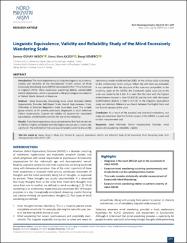| dc.contributor.author | Günay Aksoy, Şennur | |
| dc.contributor.author | Aksoy, Umut Mert | |
| dc.contributor.author | Semerci, Bengi | |
| dc.date.accessioned | 2022-12-27T11:46:06Z | |
| dc.date.available | 2022-12-27T11:46:06Z | |
| dc.date.issued | 2022 | en_US |
| dc.identifier.citation | Günay Aksoy Ş, AKSOY U, Semerci B (2022). Aşırı Zihinsel Gezinme Ölçeğinin Dilsel Eşdeğerlilik, Geçerlilik ve Güvenirlik Çalışması. Nöropsikiyatri Arşivi, 59(3), 201 - 209. 10.29399/npa.27804 | en_US |
| dc.identifier.uri | http://dx.doi.org/10.29399/npa.27804 | |
| dc.identifier.uri | https://hdl.handle.net/20.500.12941/105 | |
| dc.description.abstract | Introduction: The main objective was to study the linguistic equivalence, validity and reliability of the transliterated Turkish version of Mind Excessively Wandering Scale (MEWS) developed by Prof. Philip Asherson in England (2016). Mind excessively wandering defines uncontrolled mental phenomena, which is proposed as the psychological counterpart of Default Mode Network in literature. Method: Mind Excessively Wandering Scale, Adult Attention Deficit Hyperactivity Disorder Self-Report Scale, Barratt Impulsiveness Scale, Difficulties in Emotion Regulation Scale have been used. The sample group consists of 64 patients previously diagnosed as adult Attention Deficit Hyperactivity Disorder for validity, 60 students for transliteral equivalence, and 80 healthy controls for test re-test reliability. Results: Transliteral equivalence study demonstrates that Turkish version of MEWS is highly correlated with the English version and is statistically significant. The sixth item in the scale was removed in order to ensure the consistency model established by LISREL in the validity study according to the confirmatory factor analysis. When the sixth item was excluded, it was concluded that the structure of the scale was compatible. In the reliability study of the MEWS, the Cronbach’s alpha value (α) of the scale was found to be 0.826. It is seen that the item with the highest distinctiveness feature is Item-10 (0.618) and the item with the lowest distinctiveness feature is Item-5 (0.318). In the linguistic equivalence study, no statistical difference was found between the English form and the Turkish versions of the scale. Conclusion: As a result of the practical and statistical evaluations, our study demonstrated that the Turkish version of the MEWS is a valid and reliable measurement tool. | en_US |
| dc.language.iso | eng | en_US |
| dc.publisher | Turkish Neuropsychiatric Society | en_US |
| dc.relation.isversionof | 10.29399/npa.27804 | en_US |
| dc.rights | info:eu-repo/semantics/openAccess | en_US |
| dc.subject | Adult Attention Deficit Hyperactivity disorder | en_US |
| dc.subject | Mind excessively wandering | en_US |
| dc.subject | Reliability | en_US |
| dc.subject | Validity | en_US |
| dc.title | Linguistic equivalence, validity and reliability study of the mind excessively wandering scale | en_US |
| dc.title.alternative | Aşırı zihinsel gezinme ölçeğinin dilsel eşdeğerlilik, geçerlilik ve güvenirlik çalışması | en_US |
| dc.type | article | en_US |
| dc.authorid | Şennur Günay Aksoy / 0000-0002-0445-9180 | en_US |
| dc.department | Fakülteler, Sanat ve Sosyal Bilimler Fakültesi, Psikoloji Bölümü | en_US |
| dc.contributor.institutionauthor | Günay Aksoy, Şennur | |
| dc.identifier.volume | 59 | en_US |
| dc.identifier.issue | 3 | en_US |
| dc.identifier.startpage | 201 | en_US |
| dc.identifier.endpage | 209 | en_US |
| dc.relation.journal | Nöropsikiyatri Arşivi | en_US |
| dc.relation.publicationcategory | Makale - Uluslararası Hakemli Dergi - Kurum Öğretim Elemanı | en_US |

















